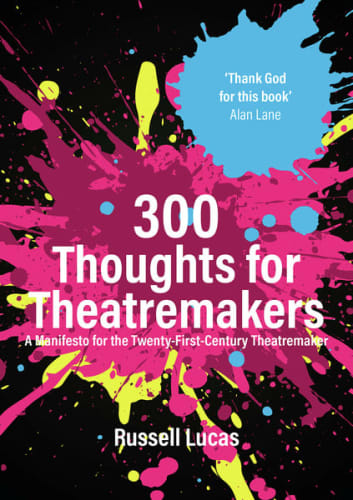Author Russell Lucas—who has adopted the growing modern job title of 'theatremaker' rather than conventional labels such as 'writer', 'director' or 'actor'—begins his introduction by stating that he has one GCSE and no degree and grew up in an Essex seaside town where, at sixteen, "you were expected to work in a chip shop or on the pier and that was you done."
This could be the prelude to a chip-on-the-shoulder attack on the current theatre industry with proposals to radically overhaul every aspect of it, but, while he does have some gripes—he isn't a fan of the West End, doesn't consider degree courses to be of much use to theatremakers and has reservations about public funding for the arts—it isn't that kind of book at all.
It is, as the title suggests, a collection of 300 random thoughts, arranged into categories, ranging in length from a page down to just a few words, but it isn't a 'manifesto' in the sense of a focussed set of guidelines on a specific way to do theatre—the ones I've read from the past century or so tend to have a very narrow view of what theatre 'should' be like, but don't focus so much on the practicalities of how to achieve it. Lucas throws out a few general ideas about the nature of theatre and performance, but on the whole, his 'thoughts' tend to be down-to-earth and practical.
Lucas's theatre focuses on the performer; everyone else is there to help that person or those people to create the performance. He is keen to emphasise that no one needs permission, qualifications or a particular background in order to create theatre, but also that the theatremaker must understand what the audience wants and needs from them, not just serve up their 'art' created in isolation and expect it to be appreciated.
The thoughts are rooted in years of experience of earning a living creating theatre, a lot of his advice consisting of practical tips on how the reader could do the same. There are anecdotes and plenty of humour as he discusses the process of creation and rehearsal—even a detailed plan for a rehearsal day with timings—of things to contend with when negotiating with or touring to venues, collaborating with others, publicity, social media, reviews and much more.
He also interrogates some common practices that have become so common as to no longer be questioned, such as the process of finding an idea then applying for funding before working on it. He writes humorously on how he hates playing games in rehearsals: "the actors seem to enjoy them whilst everyone else looks over their scripts from the sidelines thinking, 'Aww, bless...'"
As he predicts in his introduction, there are apparent contractions within the 300 thoughts and a few that I didn't agree with or seem a little glib, but there are also some that are truly inspirational; at different points, I found myself thinking either, "oh, come on!" or, "I can / want to have a go at that!"
While this is a long way from being a comprehensive manual on how to have a career in theatre—nor does it claim to be—there is plenty in here to advise, reassure or inspire anyone who is following that path.
